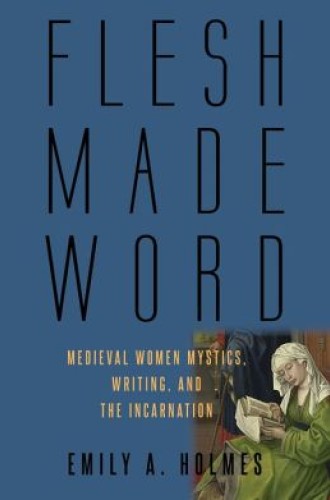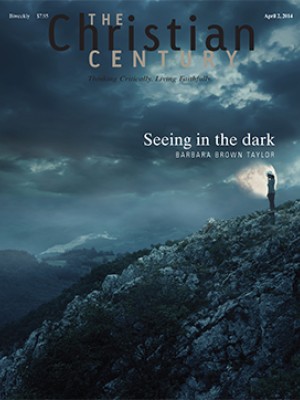Flesh Made Word, by Emily A. Holmes
In Flesh Made Word, Emily Holmes endeavors, with the help of French feminist theories, to understand several of the medieval women mystics who are most alien to 21st-century religious sensibilities. She does this by creating three pairs of authors. One woman in each pair is a present-day feminist theorist, and the other is a medieval mystic. I was not sure that these pairings would be productive, but Holmes’s strategy proves illuminating, exhibiting the subtlety and sophistication of modern and medieval writers alike.
Holmes distinguishes male hagiographers’ interest in women mystics from the theological interests of the women themselves, as revealed in their writings. Fascinated by women mystics’ visions, healings, fasting, miraculous lactation, and multiplication of food for charitable purposes, male hagiographers have thought that the women’s holiness was based on miracle and suffering, though they often insisted that they were making a sincere effort to represent the mystics’ teachings.
Read our latest issue or browse back issues.
Twenty-first-century readers, titillated and horrified by male hagiographers’ reports of medieval women’s voluntary and self-imposed suffering, have not questioned these reports of spectacular feats of asceticism. However, it would seem legitimate to question whether the requirements of the genre of hagiography inspired the more dramatic of these reports, for “in works written by their own hands, medieval women are remarkably uninterested in the bodily miracles and feats of suffering that preoccupied male hagiographers of women saints.”
Even Marguerite Porete, whose spiritual goal was annihilation of the will, considered bodily suffering a low stage of the spiritual life. She described annihilation not as self-destructive but as “freeing and empowering”; in today’s parlance, Porete’s “annihilation” might be termed getting over oneself. “The effect of annihilation is to free the soul to act, without herself and without a why, out of love of God and neighbor.”
A major theme Holmes identifies as a common concern to the medieval women she discusses is the incarnation of Jesus Christ. Citing modern women theologians who “interpret the incarnation inclusively, as extending beyond the historical body of Jesus,” Holmes describes their medieval predecessors:
The theme of incarnation in the writings of medieval women reveals how they interpreted it as authorization for their own spiritual writing practices. In their texts the incarnation emerges as an inverted paradigm for their theological writing: because the Word of God became flesh for them, their flesh in turn becomes divine word through mystical writing and speech. . . . The incarnation is not a once and for all event, but an ongoing embodiment of the divine. . . . All embodied ethical and spiritual practices that seek justice and the love of God and neighbor are ways of living into the incarnation of Christ.
The imitation of Christ was interpreted differently by different medieval women mystics: for example, Angela of Foligno’s spirituality focused on sharing the sufferings of the God-man, but Hadewijch of Brabant resisted that interpretation, preferring to explore metaphors of “hunger and satiety, of enjoyment and suffering, of growing up and giving birth.”
Medieval women mystics are a neglected strand of Christian history, and their neglect is illuminated by 20th-century feminist theory. Holmes identifies the particular support for feminist theology offered by theorists Luce Irigaray, Julia Kristeva, and Hélène Cixous. First they “question the binary oppositions that have structured Western metaphysics, including much of Christian theology”; second, they make it possible to interpret the Word of God not as “transcendent, immaterial, wholly disembodied and atemporal,” but as structured by “the rhythms of the body, the materiality of the text, and the breath that makes speech possible.” Holmes writes, “We can meet the theological Word as spoken, written, gendered, and embodied.” Third, they suggest that “the flesh of the incarnation cannot be restricted to a particular male body.” Extending the idea of incarnation as diversely embodied, Holmes writes, “Christ is truly encountered as multiple.”
The medieval women mystics discussed in Flesh Made Word desired not only to participate in the incarnation in the flesh, in the human nature of Jesus; they also, and with scriptural warrant, desired participation in his divine nature, in divinization. Rather than imitating Christ, Porete sought to become Christ. Irigaray writes of recovering the “sensible transcendental,” overcoming the “pathological splitting—in which one side is valued while the other is rejected.” In the long tradition of apophatic theology (acknowledgment of the unknowability of God), Holmes’s medieval women mystics recognized that the incarnation both reveals and conceals God’s transcendence. Ironically, medieval women mystics, “aware of the boundaries of theological language and the risks of misrepresenting God,” were not silenced but rather produced “a fecundity of speech that is rooted in the incarnation and the love it reveals.”
Flesh Made Word exposes a strand of the Christian tradition that has been poorly understood—often in its own time as well as in ours. Porete was executed by burning in 1310. The closely guarded unity of the Christian tradition, never a historical actuality, has robbed generations of Christians of the rich diversity of perspectives that compose the tradition. Holmes is one of a number of contemporary women theologians who are recovering historical women’s perspectives and exploring their riches for contemporary theology.
Flesh Made Word is not easy reading, but it is clearly written—in fact, it contains some of the clearest exposition of French feminists I have read. The use of contemporary feminist theory to illuminate medieval mystics, also clearly articulated, overcame my skepticism about the possibility that 20th-century theorists could help us understand women who wrote almost a thousand years ago. Flesh Made Word offers a broad palette with which to interpret and practice the Word made flesh, a central but underdeveloped doctrine at the heart of Christian faith.






